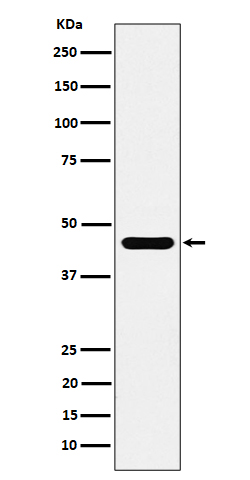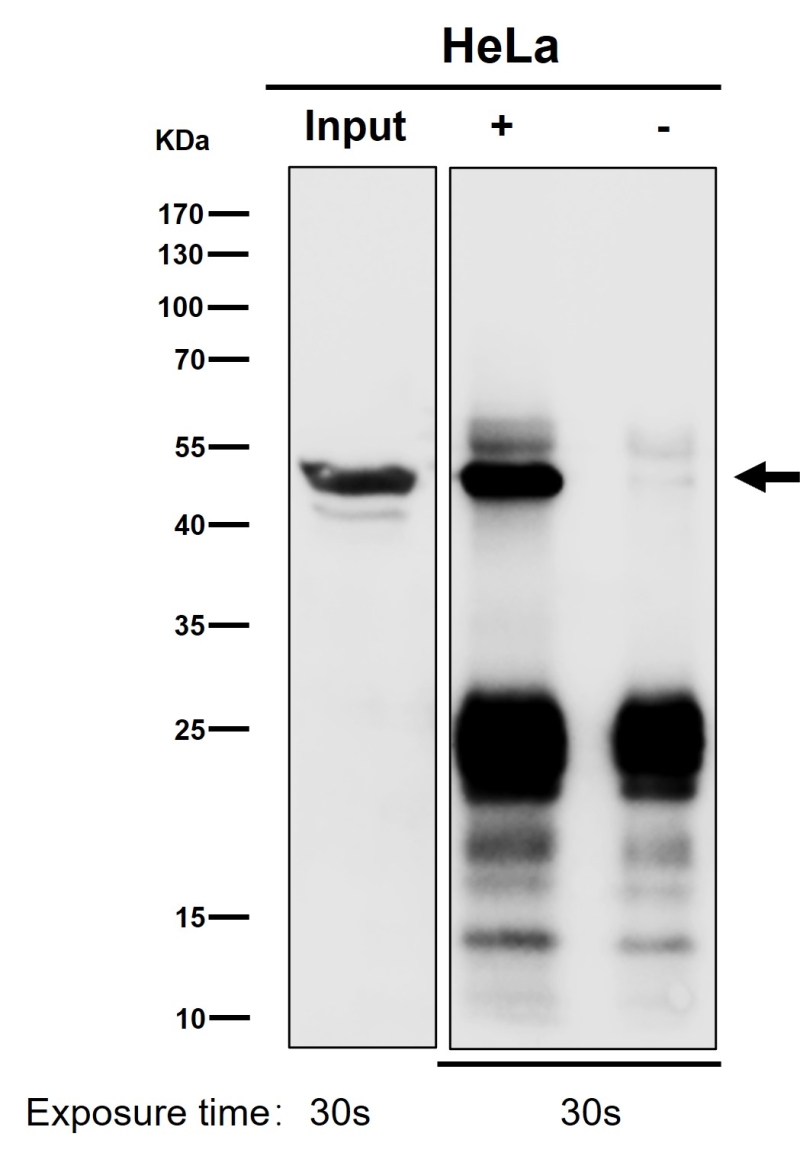

| WB | 咨询技术 | Human,Mouse,Rat |
| IF | 咨询技术 | Human,Mouse,Rat |
| IHC | 咨询技术 | Human,Mouse,Rat |
| ICC | 技术咨询 | Human,Mouse,Rat |
| FCM | 咨询技术 | Human,Mouse,Rat |
| Elisa | 咨询技术 | Human,Mouse,Rat |
| Aliases | ACTR1B; ARP1B; Beta centractin; CTRN2; PC3;;ACTR1B |
| WB Predicted band size | 42 kDa |
| Host/Isotype | Rabbit IgG |
| Antibody Type | Primary antibody |
| Storage | Store at 4°C short term. Aliquot and store at -20°C long term. Avoid freeze/thaw cycles. |
| Species Reactivity | Human |
| Immunogen | A synthesized peptide derived from human ACTR1B |
| Formulation | Purified antibody in PBS with 0.05% sodium azide,0.05% BSA and 50% glycerol. |
+ +
以下是关于SFXN4抗体的3篇参考文献,按文献主题和内容概括整理:
---
1. **文献名称**:*SFXN4 is a mitochondrial serine transporter required for one-carbon metabolism*
**作者**:Kory, N., et al.
**摘要**:该研究通过CRISPR筛选和代谢组学分析,发现SFXN4是线粒体内丝氨酸转运的关键蛋白,参与一碳代谢。文中使用特异性SFXN4抗体验证其在线粒体膜定位及敲除后代谢物变化。
---
2. **文献名称**:*Comprehensive characterization of mitochondrial proteome in glioblastoma cells*
**作者**:Alvarez, S.W., et al.
**摘要**:研究利用SFXN4抗体分析胶质母细胞瘤中线粒体蛋白表达,发现SFXN4与肿瘤代谢重编程相关,可能通过调节铁硫簇合成影响癌细胞增殖。
---
3. **文献名称**:*Sideroflexin family members function as iron transporters in mitochondria*
**作者**:Fondi, M., et al.
**摘要**:探讨sideroflexin家族(包括SFXN4)在线粒体铁离子转运中的作用,通过免疫印迹和免疫荧光(使用SFXN4抗体)证实其表达模式及铁代谢功能缺陷的影响。
---
*注:若需具体文献年份或期刊细节,建议通过PubMed或Google Scholar结合“SFXN4 antibody”、“mitochondria”等关键词检索。*
The SFXN4 (sideroflexin 4) antibody is a research tool used to study the SFXN4 protein, a member of the sideroflexin family implicated in mitochondrial function and iron metabolism. SFXN4 is a transmembrane protein localized primarily in mitochondria, though its exact biological role remains under investigation. Studies suggest it may participate in iron transport or homeostasis, potentially influencing heme synthesis, iron-sulfur cluster assembly, or mitochondrial respiration. Dysregulation of SFXN4 has been tentatively linked to mitochondrial disorders and metabolic diseases, though mechanistic insights are limited.
Antibodies targeting SFXN4 enable researchers to detect and quantify its expression in cells or tissues via techniques like Western blotting, immunofluorescence, and immunohistochemistry. These antibodies are typically raised in model organisms (e.g., rabbits, mice) using immunogenic peptide sequences specific to SFXN4. Commercial antibodies often undergo validation in knock-out/knockdown models to confirm specificity.
Current research focuses on clarifying SFXN4's interaction partners, its role in iron-related pathways, and its potential as a biomarker or therapeutic target in diseases like anemia, neurodegeneration, or cancer. However, limited literature and functional data highlight the need for further studies. Researchers rely on SFXN4 antibodies to map its expression patterns across tissues, assess its regulation under stress conditions, and explore its contribution to mitochondrial pathologies.
×